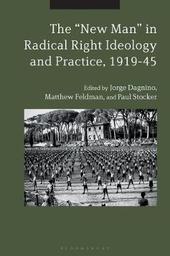
|
The "New Man" in Radical Right Ideology and Practice, 1919-45
Paperback / softback
Main Details
| Title |
The "New Man" in Radical Right Ideology and Practice, 1919-45
|
| Authors and Contributors |
Edited by Dr Jorge Dagnino
|
|
Edited by Dr Matthew Feldman
|
|
Edited by Dr. Paul Stocker
|
| Physical Properties |
| Format:Paperback / softback | | Pages:320 | | Dimensions(mm): Height 234,Width 156 |
|
| ISBN/Barcode |
9781350123052
|
| Classifications | Dewey:320.53309041 |
|---|
| Audience | | Tertiary Education (US: College) | |
|---|
| Illustrations |
11 bw illus
|
|
Publishing Details |
| Publisher |
Bloomsbury Publishing PLC
|
| Imprint |
Bloomsbury Academic
|
| Publication Date |
25 July 2019 |
| Publication Country |
United Kingdom
|
Description
Bringing together an expert group of established and emerging scholars, this book analyses the pervasive myth of the 'new man' in various fascist movements and far-right regimes between 1919 and 1945. Through a series of ground-breaking case studies focusing on countries in Europe, but with additional chapters on Argentina, Brazil and Japan, The "New Man" in Radical Right Ideology and Practice, 1919-45 argues that what many national forms of far-right politics understood at the time as a so-called 'anthropological revolution' is essential to understanding this ideology's bio-political, often revolutionary dynamics. It explores how these movements promoted the creation of a new, ideal human, what this ideal looked like and what this things tell us about fascism's emergence in the 20th century. The years after World War One saw the rise of regimes and movements professing totalitarian aims. In the case of revolutionary, radical-right movements, these totalising goals extended to changing the very nature of humanity through modern science, propaganda and conquest. At its most extreme, one of the key aims of fascism - the most extreme manifestation of radical right politics between the wars - was to create a 'new man'. Naturally, this manifested itself in different ways in varying national contexts and this volume explores these manifestations in order to better comprehend early 20th-century fascism both within national boundaries and in a broader, transnational context.
Author Biography
Jorge Dagnino is Assistant Professor in Modern European History at the Universidad de los Andes, Chile. Matthew Feldman is Professor in the History of Modern Ideas at Teesside University, UK, and co-director of the Centre for Fascist, Anti-fascist and Post-fascist Studies. Paul Stocker recently submitted his PhD thesis at Teesside University, UK. He is currently Lecturer at Richmond, the American International University in London, UK.
ReviewsComprising an introduction and 13 chapters (all with extensive notes and bibliography), this volume addresses regimes and radical movements, mainly fascist, in Italy, Germany, Croatia, Portugal, Spain, Britain, France, and Romania, and rightist regimes in Argentina, Brazil, and Japan. Summing Up: Recommended. Graduate students, researchers, faculty. * CHOICE * A useful contribution to fascist studies ... One of the anthology's strengths is the wide variety of different approaches, such as art, science, and political history, to understand and historicize interwar fascist ideology ... A highly recommended book. * Terrorism and Political Violence * This geographically and conceptually wide-ranging collection brightly elucidates the constructions and constrictions of the New Man in radical right politics and culture. Bringing together rising stars and leaders in the field, this rich collection of cutting-edge research and illuminating case studies does much to advance what deserve to be central debates about gender and masculinity in the fascist project. It is just what is needed to invigorate the field, and it will become essential reading for students and scholars. * Julie Gottlieb, Reader in Modern History, University of Sheffield, UK * This ground-breaking collection of essays is the first to seriously conceptualize and dissect the 'New Man' as constructed by radical right and fascist movements, parties and regimes during the first half of the twentieth century. The volume situates the phenomenon in the socio-cultural mileu of interwar Europe, but also examines cases in South America and Asia. Highly recommended for students of political ideologies. * Andres Kasekamp, Professor of History, University of Toronto, Canada *
|